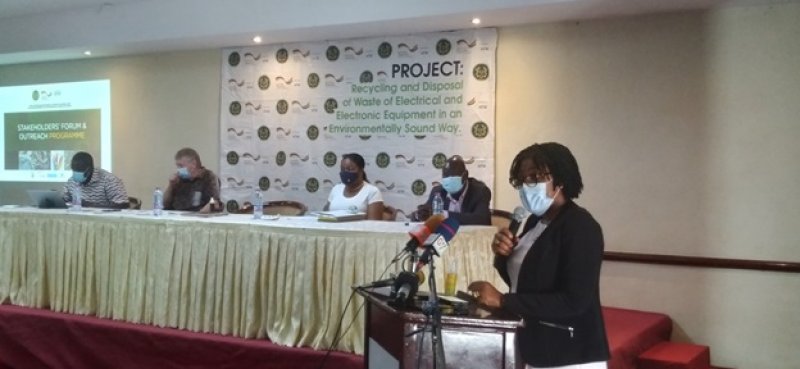The Ministry of Environment, Science, Technology and Innovation has engaged key stakeholders within the electronic waste (e-waste) value chain on the implementation of a project aimed at managing the disposal of e-waste in a sound environment in Kumasi.
The project, which is also seeking to minimize negative environmental and human health impacts from improper management of e-waste, is a collaboration between the Ministry and the German Government through KFW.
Representatives from scrap dealers associations, electronic repairers, environmental health officers, waste management companies, and the Environmental Protection Agency (EPA) attended the forum.
It was to raise awareness of the project and to get the concerns of the participants to help inform policy and project implementation.
Under the 20-million Euro project, which started in 2018, the German government is supporting Ghana to set up an incentive mechanism for the sound collection, dismantling, recycling, and disposal of e-waste.
Consequently, a Handover Centre has been established in Accra to purchase e-waste from scrap collectors at a fee slightly above the market value as an incentive to halt the burning of e-waste to obtain copper.
The Chief Director of the Ministry, Mrs. Cynthia Asare Bediako, in a speech read on her behalf, said the project was modeled to align with provisions of Act 917 and provided the government the opportunity of identifying challenges and lessons learnt to improve upon national systems once it fully took off.
According to her, over 50 tonnes of e-waste cables were purchased by the Handover Centre at Agbogloshie since the incentive payment system was launched in June, last year.
“The project hopes by mid-April 2021, to commence the purchase of mixed batteries at Agbogbloshie. These e-waste fractions when collected will be offloaded to licensed recycling companies to handle them in an environmentally sound manner”, she stated.
She said it was important to sensitize all stakeholders on the Regulatory Framework on e-waste management in Ghana and outline the roles each of them could play for a successful implementation of the project.
The Director, Policy Planning, Monitoring and Evaluation, and the Project Coordinator, Mrs. Lydia Essuah, said Ghana’s e-waste management was largely controlled by the informal sector with close to 97 percent dominance.
She said they employed crude, rude and unconventional methods to recover the valuable component and indiscriminately disposed of the hazardous component at the detriment of the environment and human health.
The current system, she said, was not sustainable and that was why the government has taken steps including policy direction, legislation, business models, and funding to address the problem.
Latest Stories
-
Paris 2024: Opening ceremony showcases grandiose celebration of French culture and diversity
3 hours -
Spectacular photos from the Paris 2024 opening ceremony
4 hours -
How decline of Indian vultures led to 500,000 human deaths
4 hours -
Paris 2024: Ghana rocks ‘fabulous fugu’ at olympics opening ceremony
4 hours -
Trust Hospital faces financial strain with rising debt levels – Auditor-General’s report
5 hours -
Electrochem lease: Allocate portions of land to Songor people – Resident demand
5 hours -
82 widows receive financial aid from Chayil Foundation
5 hours -
The silent struggles: Female journalists grapple with Ghana’s high cost of living
5 hours -
BoG yet to make any payment to Service Ghana Auto Group
5 hours -
‘Crushed Young’: The Multimedia Group, JL Properties surprise accident victim’s family with fully-furnished apartment
6 hours -
Asante Kotoko needs structure that would outlive any administration – Opoku Nti
7 hours -
JoyNews exposé on Customs officials demanding bribes airs on July 29
7 hours -
JoyNews Impact Maker Awardee ships first consignment of honey from Kwahu Afram Plains
8 hours -
Joint committee under fire over report on salt mining lease granted Electrochem
8 hours -
Life Lounge with Edem Knight-Tay: Don’t be beaten the third time
8 hours

